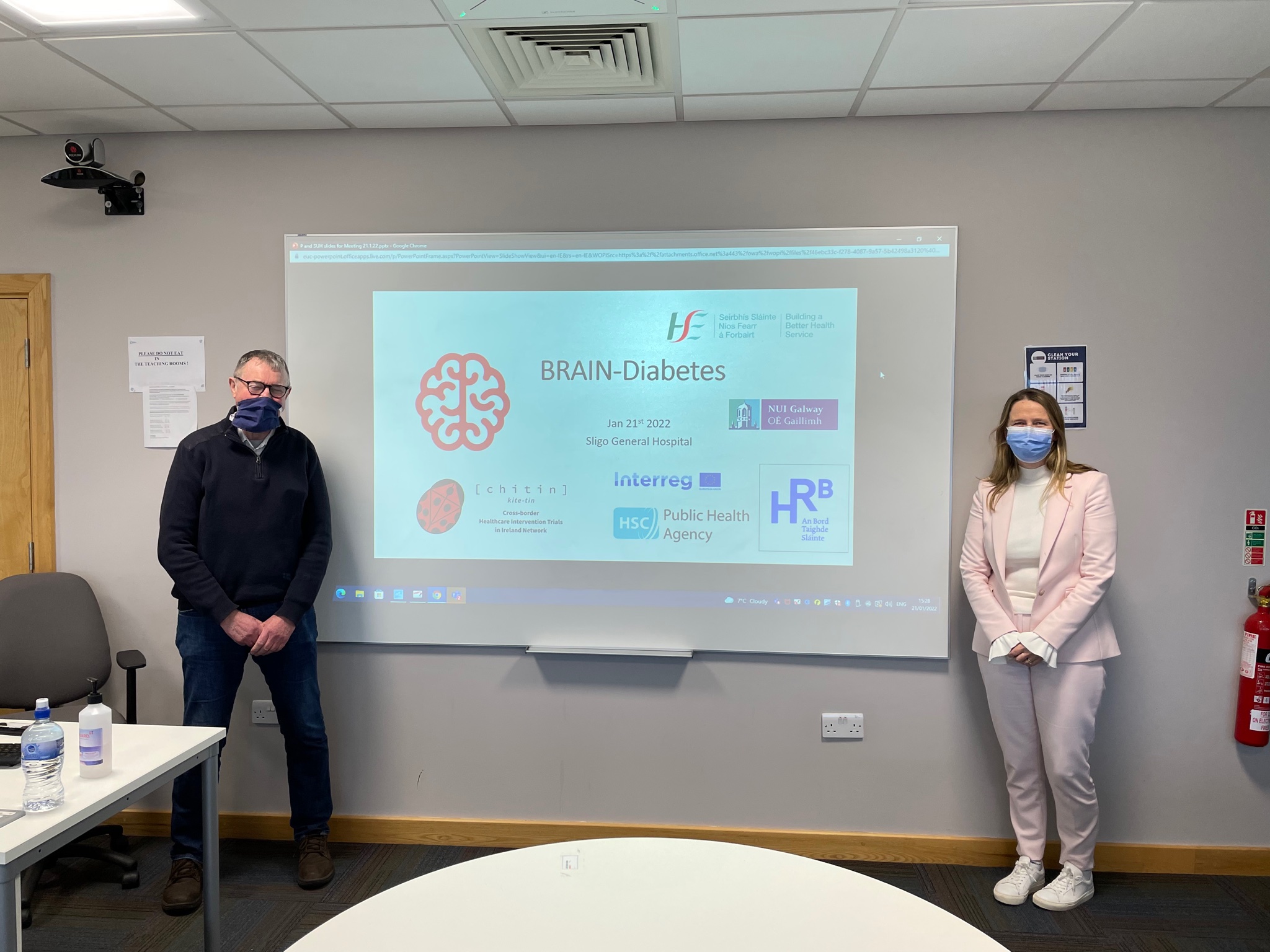
The blog below is written by Dr Claire McEvoy and is about the BRAIN-Diabetes study dissemination event in October 2022, with highlights of the aims, findings and learning of this study.
The BRAIN-Diabetes study was to test the feasibility of a multidomain intervention in people with type 2 diabetes.
Host Organisation – Queen’s University Belfast. Presenters: Dr Claire McEvoy (Queen’s University Belfast), Professor Peter Passmore (Queen’s University Belfast), Prof Geraldine McCarthy (University of Galway and Sligo Leitrim Mental Health Services), Ms Valerie Mortland (Western Health and Social Care Trust).
Dementia causes irreversible brain damage that affects memory skills as well as the ability to carry out everyday tasks. While there is currently no cure for dementia, research has shown that we can delay or prevent dementia by addressing lifestyle risks. Type 2 diabetes is associated with almost three-times greater risk of developing dementia in later life but to date there have been no trials testing ways to optimise brain health in people with type 2 diabetes. The Finnish Geriatric Intervention Study to Prevent Cognitive Impairment and Disability (FINGER) was the first randomised control trial to show that a lifestyle intervention could prevent cognitive decline1.
Older people who were assigned to the intervention group were provided with advice on eating a healthy diet, a programme for physical activity, a computerised brain training programme and a management plan for their heart health. After two years, they had significantly less cognitive decline, and a better overall quality of life compared to those in the control group who had made no changes to their lifestyle1. We want to understand if these results can be replicated in Ireland where there are different cultures, lifestyle habits and health beliefs.
The Border Region Area lifestyle Intervention study for healthy Neurocognitive ageing in Diabetes (BRAIN-Diabetes Study) aimed to testing an adapted version of the FINGER intervention in people with type 2 diabetes living in rural areas of Sligo/Leitrim/Tyrone/Fermanagh.
What did we do to design the BRAIN-Diabetes Trial?
Dr Claire McEvoy discussed the focus group research that was conducted in 21 older people (11 men and 10 women) with type 2 diabetes to understand the barriers to adopting a FINGER brain healthy lifestyle. One of the major barriers was having to make changes to eating habits that were not compatible with cultural norms. Given that farming is the backbone of rural Ireland, brain unhealthy foods, for example, butter, cheese, and red meat, hold a central cultural place in the lives of our rural communities and our discussions indicated these foods would be difficult to give up completely. Other barriers were a lack of confidence and motivation for starting the physical exercise and computerised brain training programmes. There were also several factors that people felt could improve the acceptability of the FINGER intervention including the provision of personalised education, support from a trusted expert, having a flexible and accessible exercise programme and inclusion of strategies like goal setting to support small and sustainable improvements in lifestyle behaviours over time. Dr McEvoy discussed how this research informed the design of an adapted FINGER model to make it practical and acceptable for people with type 2 diabetes living in the rural regions.
Challenges of implementing the Brain-Diabetes Trial in the COVID-19 Pandemic
The Brain-Diabetes Trial was ready to start recruiting when the COVID-19 pandemic hit in 2020. Professor Peter Passmore, the study chief investigator, discussed several adjustments that were required to the study protocol to minimise risk to research staff and participants, for example the diet, exercise and computerised brain training had to be changed to be delivered by the expert remotely via video call rather than in person. The exercise intervention was also changed to a home-based programme and supported with access to online classes. Prof Passmore explained that the team experienced many unforeseen challenges during COVID-19, for example we were unable to recruit expert dietitians and physios through existing health service structures to deliver the interventions at our study sites. However, we rolled up our sleeves and worked as a cohesive team to solve each problem and get the study off the ground.
In all, COVID-19 delayed the study for around 18 months. August 2021 brought some very exciting news – the first study volunteer was recruited at our Sligo site! Professor Geraldine McCarthy discussed how the roll-out of BRAIN Diabetes in Sligo was welcomed by participants, research staff and supporting organisations such as Diabetes Ireland. People were enthusiastic taking part in a big European funded study in the rural Northwest. A few months later Recruitment began in Tyrone and Fermanagh too. Despite the challenging times, Brain Diabetes successfully recruited 80 eligible participants with type 2 diabetes to take part with 40 participants assigned to the culturally adapted FINGER intervention group and 40 participants to the control group for six months. The study team are currently analysing the data in earnest and hope to have the findings available in early 2023.
Reflecting on what worked well, Valerie Mortland (study nurse co-ordinator) said: “the value of peer support and teamwork within this study was instrumental to its achievements, with the encouragement and advice exchanged across all sites when faced with challenges. The support given to the coordinators and nurses implementing the study was appreciated and within the research nurse/coordinator team a close working relationship was formed, which made the challenges we faced more easily overcome”.

